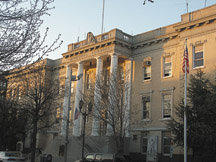Gov. Christopher Christie’s proposed public cuts to municipal and school aid have kept public officials on their toes over the last week as they brace for the impact the cuts could have on their towns.
The governor has vowed to stop rewarding cities and towns who irresponsibly spend and to stop “tax madness” in New Jersey.
In Union City and West New York, the school districts could stand to lose the most. The $38 million surplus that Union City had for this school year was “taken away” by the state shortly after Christie began his term, according to Joe Lauro, spokesman for the Union City Board of Education, and the district stands to lose another $8.5 million dollars in aid for the next school year.
West New York School District’s budget for this year was untouched, but they could lose just under $4 million dollars in state aid for next year.
Although the legislature still has to vote on the budget, local towns and school districts are preparing for the outcome.
________
Last year, West New York received $450,000 in “extraordinary” aid for its town budget, but careful planning may help buffer the effects of the proposed cuts.
Union City received $11 million in special aid before former Gov. Jon Corzine left office in January.
The proposed cuts were announced by the governor on March 16 in an address he gave to the state Legislature regarding the $28.3 billion 2010-2011 state budget. Although the legislature still has to vote on the budget, local towns and school districts are preparing for the outcome.
Preserving jobs and classroom size
Christie has asked the state’s schools to abruptly reduce spending by 5 percent in one year, a move which could force substantial layoffs of teachers and other personnel (a large portion of costs in most districts).
Some fear that the cut in spending could mean larger class sizes and less extracurricular programs.
In West New York, Assistant Superintendent John Fauta said that officials from the district have been continuously meeting since the proposed cuts were announced.
The budget was presented to the Board of Education on March 19 and will be presented to the public during a regularly scheduled meeting open to the public on March 31.
“We’re taking precautions,” he said. “We’re working very hard to save people’s jobs while adjusting the budget; we’re doing what we can.”
According to Fauta, new retirees may help save jobs in the West New York School District.
“What is fortunately happening is a lot of people are retiring,” said Assistant Superintendent John Fauta. “So we may not be losing that many people.”
In particular, retirees from higher paying positions will help to save double the amount of employees. Fauta said that every district is in a tough position, but they are hoping it won’t be as bad as people are anticipating.
Extracurricular programs
In Union City the sentiment is similar, as officials are considering cutting extracurricular programs which take place in the evenings or on the weekend.
“Our main goal in the schools is to not interrupt the core teaching and curriculum,” said Joe Lauro, a spokesman for the Union City Board of Education. “The last place we would cut is in the classrooms, [because] we still have to meet state core requirements.”
Lauro spoke on behalf of Superintendent Stanley Sanger, who returned to work last week after being out for two months on sick leave.
While the construction on the new elementary school won’t be halted because it comes from a different fund, Lauro said the technology that goes inside of it could be affected.
He did not know when the new budget is scheduled to be completed or presented to the public.
Municipal preparation
Commissioner of Revenue and Finance Gerald Lange said that West New York is on solid financial ground because of a strong financial team.
“We anticipated a drop in state aid [and] we put that into our budget” said Lange.
But he added that the tough action taken in Trenton is being done without regard for alleviating or providing transitional solutions for programs such as the Urban Enterprise Zone.
Lange said that the town may see problems in the long run from the effect funding cuts from the Urban Enterprise Zone (UEZ) program could have if the state resolves to keep the entire 3.5 percent sales tax charged in the zone.
That could mean streetscape and façade programs not moving forward and less police presence along Bergenline Avenue.
Union City’s stretch of Bergenline Avenue is also part of a UEZ zone, but Union City Commissioner of Revenue and Finance Maryury Martinetti did not return calls for comment on how that city plans to deal with the proposed cuts in state aid.
Lana Rose Diaz can be reached at ldiaz@hudsonreporter.com.
